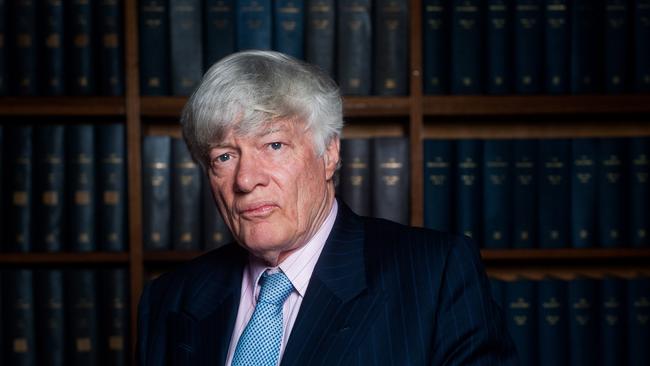Q&A: Geoffrey Robertson QC, human rights lawyer, author, 73
Geoffrey Robertson QC on the end of rule-based order in the world and the one silver lining in the coronavirus crisis.

Is there one episode of your long-running TV show Hypotheticals that stands out for you? I sat John Howard on a toilet and he had to decide whether to rub out some racist graffiti or to call over the toilet attendant, who was Charlie Perkins. So there were some marvellous moments like that. The logic and force of the hypothetical drove people to conclusions that as politicians they couldn’t take. The format kept them honest.
What concerns you about the world now? [Client] Julian Assange on his way to prison for life; anyone concerned with freedom of speech should be concerned at the peril he’s in. And threats to liberal democracy – the challenge today comes from what might loosely be termed the alt-right. And of course there’s the end of rule-based order in the world: America tears up the Paris accords, the World Trade Organisation, the Iran [nuclear] deal... I don’t need to go on. The world is turning upside down and I’d like to see it put to right.
There was a sense the wheels were falling off even before a pandemic hit… Coronavirus took us by surprise and it has certainly added another element. But one thing that makes me optimistic about humankind is this counterfactual capacity for kindness. And I think that, in a way, coronavirus has spread that sense of carefulness and consideration for other people, which is the only way we’re going to survive it.
As a barrister, you’ve acted for everyone from the Sex Pistols to Salman Rushdie and won many landmark cases. Is there one you’re most proud of? I did a case [involving death row inmates in Trinidad] which virtually ended the death penalty in a number of countries – I’m told this has saved the necks of over 1000 people in the 30 years since the precedent was set. The argument took a month and it probably took me four or five months to prepare it. That is probably the most impactful case that I have done, although I like to think that every case has some significance.
In your memoir you write about driving a souped-up pink Renault to the Old Bailey, playing Dylan and Springsteen to “rev up for the fight”. What’s the soundtrack these days? Probably Placido Domingo singing opera. I’m in my anecdotage now but I take inspiration from Trump because he’s older than I am, as is Biden. So 80 is the new 50, I think.
You were married for 27 years to writer Kathy Lette before an amicable split. Did she teach you “anecdotage”? She’s very witty. A witty woman and a witty wife.
What is your opinion of social media? It has allowed extraordinary freedom of speech for all in certain countries, and that’s a good thing; but it has also permitted outbursts of the most hideous racism and sexism. We can’t stop it but we can insist it is regulated so that incitements to violence are not permitted. I don’t see that as silencing freedom of speech.
Do you Tweet? Oh, I’m a Luddite. I write with a fountain pen, or at least a Montblanc biro. But of course mobile telephones and iPads are now a part of everyday life. I wish they weren’t because my preference would be to sit at a desk and think something out without the relentless ping of my iPad. But my instant availability suits my clients.




To join the conversation, please log in. Don't have an account? Register
Join the conversation, you are commenting as Logout